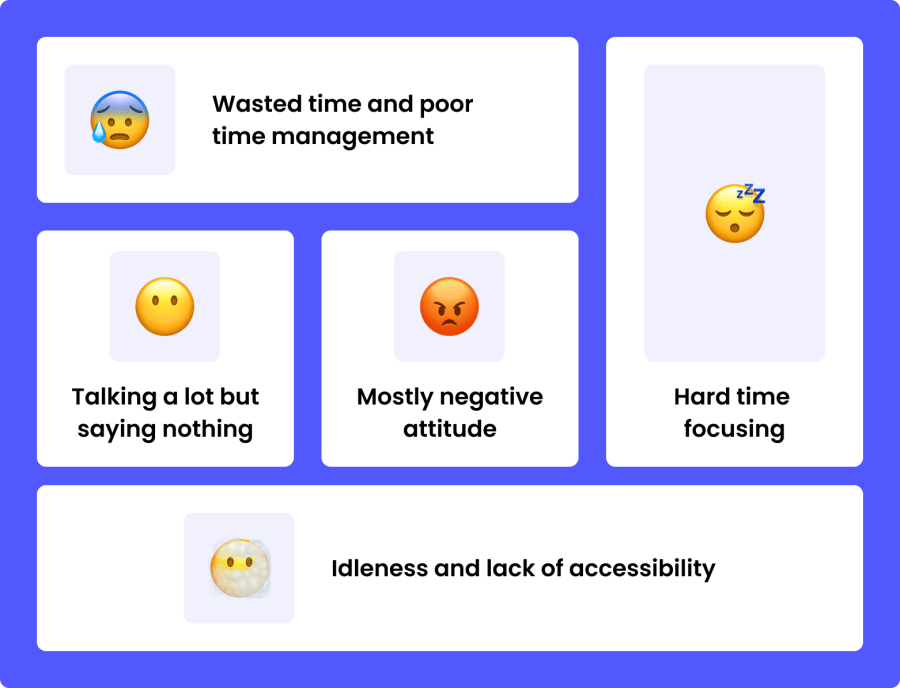There are many reasons why someone would procrastinate. Still, the situation becomes alarming when work dynamic lags or whole teams within a company are affected due to the behavior of one coworker.
Overall, we need to define whether this is a personality trait that will likely last long-term (forever)? Is it innate? Or is it a defensive mechanism for employees who do not seem to fit a company culture? Perhaps it is a behavior of someone that tries to be better at their job but is not an ideal fit, and they are aware of it.
In any case, it is good to look into the reasons for procrastination and check if you can do something about it as a manager or team lead. The good news is that there are always a few possible solutions to try out with those employees and hopefully get on the right track with the workload and overall work environment.
Below we offer some insight into the signs of procrastination and some suggestions on solutions and managing these workplace situations. In a way, everything that leads to better performance simultaneously improves the company culture and will be evident in happier and more productive employees.
Signs of procrastination

There are always some clear and telltale signs that someone procrastinates. Of course, there are many signs of procrastination, but a few obvious are:
- Wasted time and poor time management – since procrastinators tend to delay everything as further as possible, it can be a sign of bad time management. When they are nearing a deadline, the feeling of urgency sets in, and they deliver work late, almost always.
- Idleness and lack of accessibility – perhaps this is, in a way, a lack of accessibility, responsiveness, or similar. It is a tricky one, and truth be told, as long as someone is respectful of timeframes and deadlines on a daily/weekly basis, it is somewhat alright, as long as they deliver good work. But it is not a great sign if the procrastinator is rarely online or reachable to the boss, manager, lead, or coworkers.
- Talking a lot but saying nothing – interestingly, procrastinating employees can adopt a specifically eloquent attitude to suppress the fact that there is not much done work-wise. They could try (intentionally or not) to sway you away from discussing pressing and urgent or relevant work matters by discussing something that everyone has said, done, knows, etc.
- Mostly negative attitude – when a procrastinator adopts a negative attitude toward something, it is their fear or even perfectionism. Why? It could be fear of failure for some tasks and not doing them right. Or a significant perfectionist streak hinders them from even starting a task in the first place out of fear that it won’t be perfect or better than the work of others in the team.
- Hard time focusing – similarly to talking much and saying nothing, when someone is focused, they say relevant things and do work diligently, on time, and on point. Procrastinators might lack focus and talk a lot to distract the others in the call/meeting/conversation, for example, but the relevant contribution is simply not there.
Find out the reason for procrastination
To help or improve the performance of those team members who procrastinate, we need to define, to some extent, the reason for that. Usually, and in most cases, the reason is poor planning and time management on behalf of the employee.
But, in other cases, it is mainly because those employees feel either: a lack of motivation or fear of failure to execute tasks as perfectly as possible. Other reasons could also be a lack of support or guidance for those tasks or even a negative company culture.
Solutions for dealing with procrastination
Add relevance and importance to tasks you assign
Project management is a broad term that encompasses more aspects, and one aspect you must always consider is adding relevance and ‘organic’ meaning and goals for the work tasks.
The point is not to do work mechanically, even if the employee is an expert at their job. There has to be something motivating, challenging (in a good way), something that makes the employee eager to start on the tasks.
It is a good starting point here to explain why specific tasks are incredibly relevant and how they benefit not just the company but the employee's career growth.
Set clear and defined milestones and time expectations
Complex and demanding tasks would need more time, understandably. In turn, if someone is late with a simple task and a reasonable amount of time given before it, this is an obvious problem and bad time management on the employee’s behalf.
Good time management is a vital part of preventing or stopping procrastination. Make sure to set clear timeframes for finishing the tasks, but don’t forget to align the complexity of the tasks with the time given to do them.
Think a step ahead of the ‘real’ deadlines when you assign tasks
Another tip here, in context with the mentioned above: it’s a good idea to assign something with a date that is not the ‘correct’ date for tasks finishing.
For example, you assign a task to be done in one week. Knowing that the procrastinator will wait until the last minute to do it, you know the deadline date yourself but assign the task to be finished within less time than that deadline.
Set up meetings regularly
Regular meetings are a fantastic way to coordinate employees and assist where needed. Also, with regular conference calls and meetings, you will better understand how everyone deals with the work dynamic and see what needs improvement.
Try to schedule at least one to two weekly meetings; they don’t need to be extremely lengthy or time-consuming. Brief sessions or 1-on-1 calls with procrastinating employees benefit both sides. You can guide them through the work dynamic and suggest improvements where needed. They, in turn, will feel more confident to start tasks earlier – clarifying, advising, assisting, and constructive comments go a long way.
Simplify the multitasking
Perhaps no job involves just one single type of obligation daily. There is always something different, additional, or even a variety of task types. This can be a substantial reason for someone to procrastinate because they plan time poorly or feel insecure with some tasks but confident for others.
You can ensure no significant differences between the types of tasks you assign. For example, a content writer could write about coding or company culture, but they could not do the same technical coding they wrote about.
In this context, it’s essential to understand the employees' traits, experience, expertise, vocation, and other valuable skills. If anything, you can assign more relevant tasks to their expertise, knowing they will do those tasks more efficiently, faster, and without wasting time. Or, additionally, provide a course or educational materials for the tasks they do not quite master.
And lastly, do not go overboard with a massive volume of tasks. Be realistic when you assign the number of tasks - if they’d be a handful for yourself, they’d be a handful for the employee.
Be personally involved
Yes, personal involvement is a key to helping those employees and the company’s success. This doesn’t mean you should do the work for your employees, but instead, guide them, provide clear directions, and emphasize the importance of their tasks.
Also, make sure to stick to the regular conference calls and meetings at least once a week (as a minimum) and check/evaluate the tasks and the progress tasks.
Use constructive criticism and ‘rewarding’ words accordingly
As a team leader, it is crucial always to provide feedback when you follow how the team members execute tasks and obligations.
When work is not done, or done poorly, provide constructive criticism in a suitable manner that is not intimidating but alerts the team member of the need to change their dynamic, speed up the work, or encourage them to ask freely for assistance and directions.
In turn, if someone does a good job, or corrects their previously slacking work dynamic, acknowledge that – a good word goes a long way and prevents such lateness with tasks in the future.
How to create a winning team culture for modern tech teams
Learn to build and nurture cohesion, trust, and culture in hybrid and distributed teams.
The takeaway
To fight procrastination, you need to adopt a proper mindset and approach toward specific employees that tend to procrastinate. Work-related activities always come with certain setbacks or challenges, but that is nothing new.
What needs to be done is to get more involved in your employees’ work and dynamic, assist where needed, or provide clear and firm directions. But, do not forget about a positive and approachable attitude too, because that, combined with everything from above, retains employees for longer.






